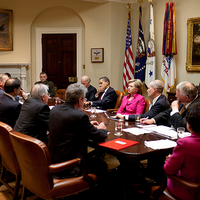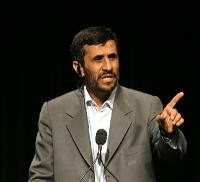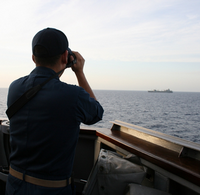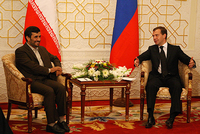Worldfocus’ Daljit Dhaliwal spoke with Flynt Leverett, director of theIran Project at the New America Foundation for some insight into theIranian leadership’s reservations about the IAEA’s recent proposalwhich would send low-enriched uranium first to Russia to be enrichedthen to France for further processing.
Iran Archive
Free Newsletter
We still don’t know the substance of Iran’s response to the proposal for multilateral enrichment cooperation on its experimental reactor. But this, from the NY Times, jumped out at me: . . . Some of Mr. Ahmadinejad’s conservative rivals have alreadycriticized the plan as a risky concession to the West, and on Thursday,the opposition leader Mir-Hussein Moussavi joined them, suggesting thatany response to the plan would have negative consequences for Iran. “Ifthey are put in place, all the efforts of thousands of scientists willgo to the wind,” Mr. Moussavi said of the proposed plan’s conditions,according to opposition Web sites. “If […]
Dare I say it? A few shards of optimism coming out of Iran and Afghanistan? Yes, according to two videos we posted in our video section today. The first video, from Al-Jazeera, looks at a new Persian film, “No One Knows About Persian Cats,” which tells the tale of a young man and woman who try to form a band after being released from prison. Their efforts take us through the underground rock scene of Tehran where the city’s youth fight for their jams. Though the story is fictional, actors from the film (now in exile in the U.K, after […]
Iranian film “No One Knows About Persian Cats” offers a look inside theworld of Tehran’s youth. Sixty percent of Iran’s population is underthe age of thirty and this film, debuting at the London Film Festival,aims to show the trials and triumphs that face Tehran’s music-lovingyounger set while they participate in an illegal underground.

Almost 30 years ago to the day, the United States broke off relations with Iran in response to the seizure of the U.S. embassy in Tehran. In doing so, the U.S. lost its most valuable source of information about the Islamic regime. To fill the void of knowledge resulting from 30 years of diplomatic estrangement, the Obama administration has turned to scholars and experts for insight into the Persian nation. Indeed, President Barack Obama’s policy of outreach toward Tehran has been decisively shaped by the wide array of Iran experts, both within the administration and without, from whom he has […]
I was going to write this post this morning, but decided to hold off until Iran responded to the IAEA draft agreement on outsourcing the uranium enrichment for its experimental reactor. Good thing I did, because it’s actually an easier argument to defend now that Iran has initially declined to accept the deal. (For Iran, that’s not the same thing as rejecting it. But the argument stands nonetheless.) My original thought was to how it was that my pessimism before the first Geneva meeting earlier this month had been so off the mark. At the time, the revelation of the […]

When mass protests erupted in Iran following charges of fraud in last June’s presidential election, Western leaders — particularly U.S. President Barack Obama — took pains not to taint those domestic disturbances with foreign fingerprints. To foreigners concerned about Iran’s nuclear aspirations, the sight of muscular internal dissent suddenly presented new and intriguing thoughts: International opposition to the Iranian nuclear program is not the only problem faced by the ruling powers in the Islamic Republic. The disturbances revealed one of Iran’s great weaknesses: widespread discontent with a regime of questionable legitimacy. Now that the regime has suppressed the protests, however, […]
New York Times Columnist Roger Cohen says Israel needs to tone down their rhetoric in dealing with Iran. The seasoned journalist talks to Charlie Rose and says that it would be unlikely for Israel to take military action against Iran while President Obama is in office. He also discusses the contested definition of a war crime with regards to the Palestinian-Israeli conflict.

On Oct. 19, at a multilateral meeting in Vienna focused on nuclear transparency, U.S. and Iranian representatives will meet for the second time in a month in the hopes of working out the modality by which the International Atomic Energy Agency (IAEA) will inspect Iran’s newly revealed enrichment facility known as Fardo, near the holy city of Qom. This particular issue is relatively straightforward, and the negotiations will likely result in the Fardo facility being placed under the IAEA’s regular regime of inspections, already firmly in place with respect to Iran’s other nuclear facilities. But it is nonetheless tied in […]

ABOARD USS DONALD COOK — It was a rare moment of excitement on a long, tedious counter-piracy patrol. On the evening of Sept. 24, lookouts on the USS Donald Cook, a Virginia-based destroyer assigned to a NATO flotilla in the Gulf of Aden, spotted a mysterious shape on the horizon. The distant vessel did not respond to Donald Cook’s hails as it loomed closer. With the cry, “Ship of interest,” crew members summoned Donald Cook’s captain, Derek Granger. Interrupted during a rare bit of down-time, Granger climbed to the bridge wearing shorts and a t-shirt. Lighting his customary cigar, he […]
I noticed that Stephen Walt’s post questioning the risk of a nuclear or near-nuclear Iran setting off a regional nuclear arms race in the Middle East was long on nonproliferation theory and non-regional historical examples. But there wasn’t much discussion of the political dynamics specific to the Middle East that would certainly play a role in such a scenario. For that I recommend this U.S. Senate Foreign Relations Committee report (.pdf) examining the factors driving Saudi, Egyptian and Turkish policy on this very question. Although it expresses no certainty, the report’s outlook is a bit less sanguine than Walt’s discussion. […]
Among the consequences of a military strike against Iran’s nuclear program, we often hear about Iran’s fearsome response capacity, which at its most potent include its proxies (Hezbollah, Hamas and militia cells in Iraq and potentially Afghanistan); its long-range missiles (capable of reaching Israel); its asymmetric and irregular assets abroad (think terrorist attacks); and the ability to close the Strait of Hormuz to oil shipping. Sam Roggeveen was the first person I remember who directly challenged a number of these assumptions. Eugene Gholz recently expressed skepticism about the oil transport angle. Now Robert Farley builds on a post by Galrann […]

At their Oct. 1 meeting in Geneva, representatives from Iran and the P5+1 (the five permanent U.N. Security Council members plus Germany) appeared to make considerable progress. The Iranian government representative agreed to allow the International Atomic Energy Agency (IAEA) to inspect its recently revealed second, secret uranium enrichment facility near the city of Qum. Iran also expressed interest “in principle” in sending its stockpiles of low enriched uranium to Russia and France for further enrichment and conversion into fuel rods for an experimental reactor used for medical purposes. Russia’s role in helping secure these developments remains unclear. Russian leaders […]

The outcome of talks to discuss the Iranian nuclear crisis on Oct. 1 between representative of the P5+1 and Iran appears to be more positive than had been anticipated. However, the reality is that the basic positions of all sides remain unchanged. In its previous attempts to solve this slow-burning crisis, the West has repeatedly failed to understand the intentions and strategies of the Iranian government. This has allowed Tehran to buy time for its uranium enrichment program and for the ongoing construction of a heavy-water reactor at Arak. The West’s focus on the enrichment issue has obscured the ways […]
I admit to being pleasantly surprised when I saw the initial reports on the outcome of yesterday’s talks on the Iran nuclear program. To be sure, this is not a sufficient step to any stable resolution of the conflict. But it was a necessary one, in that any further progress would have been impossible without first passing through this gate. One thing to keep in mind, though, to understand why yesterday’s outcome avoided the worst and does not guarantee future success, is that this was a so-far-isolated instance in this ongoing standoff where a positive outcome was in everyone’s interests. […]

Despite the encouraging outcome of yesterday’s talks in Geneva, the nuclear standoff with Iran is far from over. It will not end for the U.S. until there is full, ongoing compliance with all protocols of the Nuclear Nonproliferation Treaty (NPT) and the International Atomic Energy Agency’s (IAEA) inspection regime. And so long as Mahmoud Ahmadinejad is Iran’s president, it very likely will not end for Iran until breakout capability has been achieved. It should not be surprising that yesterday in Geneva, Ahmadinejad’s recalcitrant regime appeared to make major concessions to the permanent members of the U.N. Security Council and Germany […]
U.S. President Barack Obama spoke from the White House at theconclusion of talks in Geneva between diplomats from the United States,the United Kingdom, France Russia, China, Germany and Iran. “TheIranian government heard a clear and unified message from theinternational community in Geneva: Iran must generate through concretesteps that it will live up to its responsibilities with regard to itsnuclear program. In pursuit of that goal, today’s meeting was aconstructive beginning, but it must be followed with constructiveaction by the Iranian government,” Obama said.
